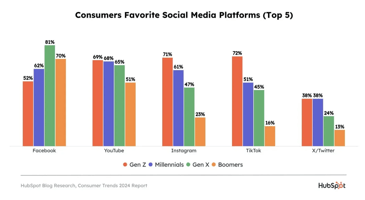Uncover why YouTube is the top choice for maximizing ROI in video marketing, and why video content...
Strategies for Businesses to Succeed in Social Media Marketing in 2024
Discover the top strategies for small businesses to excel in social media marketing in 2024 and stay ahead of the competition.
A recent Hubspot report, surveying over 1,400 marketers, has highlighted key strategies for small businesses to excel in social media marketing in 2024. One essential takeaway is the importance of implementing user-generated content strategies. By encouraging customers to create and share content related to their products or services, small businesses can boost brand visibility and credibility. Additionally, leveraging micro influencer partnerships can provide a cost-effective way to reach a highly engaged audience. Authentic storytelling plays a crucial role in connecting with consumers on a deeper level, building trust, loyalty, and emotional connections. Small businesses can also benefit from leveraging AI tools to streamline content creation and optimize posts for maximum reach. Keeping an eye on emerging social media platforms and utilizing data analytics for targeted campaigns can further enhance a small business's social media marketing strategy. Embracing these strategies can help small businesses stay ahead of the competition and thrive in the ever-evolving landscape of social media marketing.
Implement User-Generated Content Strategies
User-generated content has become increasingly influential in social media marketing. Small businesses can leverage this trend by encouraging their customers to create and share content related to their products or services. This can include reviews, testimonials, photos, videos, and more. By implementing user-generated content strategies, small businesses can not only increase their brand visibility but also build trust and authenticity among their target audience.
Another effective approach is to run contests or giveaways that encourage users to create and share content in order to participate. This not only generates user-generated content but also creates excitement and engagement around the brand.
To implement user-generated content strategies, small businesses can create branded hashtags, feature user-generated content on their social media platforms, and engage with users by liking, commenting, and sharing their content. By actively involving their customers in content creation, small businesses can create a sense of community and foster brand advocacy.
Utilize Micro Influencer Partnerships
Micro influencers are individuals who have a smaller but highly engaged social media following. Collaborating with micro influencers can be a cost-effective and impactful strategy for small businesses to reach their target audience. These influencers often have a niche focus and a dedicated following, which can result in higher engagement and conversions for small businesses.
When partnering with micro influencers, it is important for small businesses to identify influencers who align with their brand values and target audience. This ensures that the partnership is authentic and resonates with the influencer's followers. Small businesses can collaborate with micro influencers by offering them free products or services, providing them with unique discount codes to share with their followers, or even sponsoring their content.
By leveraging micro influencer partnerships, small businesses can tap into the power of word-of-mouth marketing and reach a highly targeted audience that is more likely to convert into customers.
Focus on Authentic Storytelling
In the era of social media, consumers crave authenticity and meaningful connections with brands. Small businesses can stand out by focusing on authentic storytelling in their social media marketing efforts. This involves sharing the story behind the brand, highlighting the values and mission, and showcasing the people behind the business.
Small businesses can use social media platforms to share behind-the-scenes content, employee spotlights, customer success stories, and other personal narratives that resonate with their target audience. By humanizing their brand and connecting on a deeper level, small businesses can build trust, loyalty, and emotional connections with their customers.
Authentic storytelling also involves being transparent and honest in communications. Small businesses should address customer concerns or issues promptly and openly. This demonstrates accountability and builds credibility.
Leverage AI tools to create posts
Artificial Intelligence (AI) has revolutionized various industries, and social media marketing is no exception. Small businesses can leverage AI tools to automate and enhance their social media content creation process. AI-powered tools can analyze data, identify trends, and generate personalized content recommendations, saving time and effort for small businesses.
AI tools can also help small businesses optimize their social media posts for maximum reach and engagement. These tools can analyze the performance of previous posts, identify patterns, and suggest improvements in terms of timing, content format, and targeted keywords.
By leveraging AI tools, small businesses can streamline their social media marketing efforts, improve the efficiency of their content creation process, and deliver more personalized and relevant content to their audience.
Leverage Emerging Social Media Platforms
While established social media platforms like Facebook and Instagram continue to dominate the social media landscape, small businesses should keep an eye on emerging platforms that cater to specific niches or demographics. These platforms can provide unique opportunities for small businesses to reach their target audience in a less saturated environment.
For example, TikTok has gained immense popularity among younger audiences and can be a valuable platform for small businesses targeting Gen Z consumers. Similarly, platforms like LinkedIn and Pinterest have their own specific user base and can be effective for B2B or visual-focused businesses respectively.
Small businesses should research and identify emerging social media platforms that align with their target audience and business objectives. By early adoption and strategic presence on these platforms, small businesses can gain a competitive edge and effectively engage with their target audience.
Leverage Data Analytics for Targeted Campaigns
Data analytics plays a crucial role in social media marketing success. Small businesses should leverage data analytics tools to gain insights into their audience's preferences, behaviors, and interests. By understanding their audience better, small businesses can create targeted campaigns that resonate with their target audience and drive higher engagement and conversions.
Data analytics can help small businesses identify the best performing content, optimal posting times, and most effective social media channels for their target audience. It can also provide valuable feedback on campaign performance, allowing small businesses to make data-driven decisions and optimize their social media marketing strategies.
Small businesses can use data analytics tools to track key metrics such as reach, engagement, click-through rates, and conversions. By regularly analyzing this data, small businesses can identify areas for improvement and refine their social media marketing approach to achieve better results.





Leave a comment below: